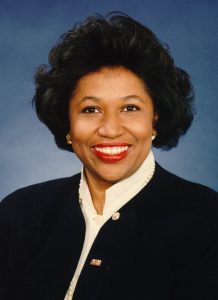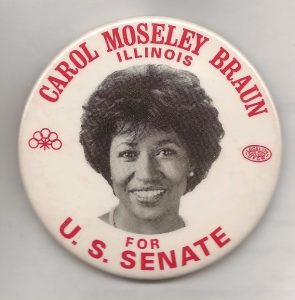Hello, everyone! My name is Megan and I’m starting my second year of undergraduate studies at the University of Chicago. I’m a history/pre-law major and I’m also a member of Pi Beta Phi Sorority. Now, you may be wondering what a South Side college student like me is doing all the way up here in Rogers Park. Well, I’ve been interning here at the Women and Leadership Archives (WLA)! This summer I have had the amazing opportunity to serve the Black Metropolis Research Consortium (BMRC) and the WLA as the Archie Motley Archival Intern. My duties as an intern were to process and archive the collection of Carol Moseley Braun.
Disclaimer: I had little to no knowledge of archives/archiving prior to accepting this internship. When I applied, I viewed archivist as next-level librarians (not a bad thing). I imagined them to be confined to dark, basement-level archives, guarding manuscripts and harboring an inexhaustible knowledge of all things. What I learned, though, is that my imagination is much too active and that archivists are simply humans who love preserving history and knowledge. Working in the WLA and processing Carol Moseley Braun’s papers taught me not only the basics of archiving, but also the importance of maintaining and protecting archives, especially those dedicated to women and other minority groups. Working on Ms. Moseley Braun’s collection has especially highlighted this for me.
Before interning at the WLA this summer, I had never heard of Carol Moseley Braun and was totally unaware of the major waves she made in American history. She attended and graduated from the University of Chicago’s Law School, was the first female African American U.S. Senator, and was responsible for getting the Confederate flag removed from Daughters of the American Revolution (DAR) signage. She served as Ambassador to New Zealand and even ran for president in 2003. Ms. Moseley Braun is truly an icon and, yet, I feel that almost no one outside of Chicago or politics gives her the credit she is very well due. Institutions like the BMRC and the WLA, though, make it their missions to highlight figures like Carol Moseley Braun and ensure that their voices are and will forever be heard.
My time here at the WLA has sadly come to a close, but I have enjoyed every moment of it! I learned so much about archiving from the women I worked with and learned so much about history from the woman’s collection I worked on. I will take everything I learned and take it with me onto my next adventure.

Megan and Melanie, two WLA interns, combing through the collection
Megan was the Archie Motley Archival Intern for summer 2017. She is completing a Bachelors of Arts at The University of Chicago, with plans to pursue history and pre-law curriculum. She is a member of the Pi Beta Phi Fraternity for Women and was previously the president of her high school’s National Honor Society.
Loyola University Chicago’s Women and Leadership Archives Blog is designed to provide a positive environment for the Loyola community to discuss important issues and ideas. Differences of opinion are encouraged. We invite comments in response to posts and ask that you write in a civil and respectful manner. All comments will be screened for tone and content and must include the first and last name of the author and a valid email address. The appearance of comments on the blog does not imply the University’s endorsement or acceptance of views expressed.


